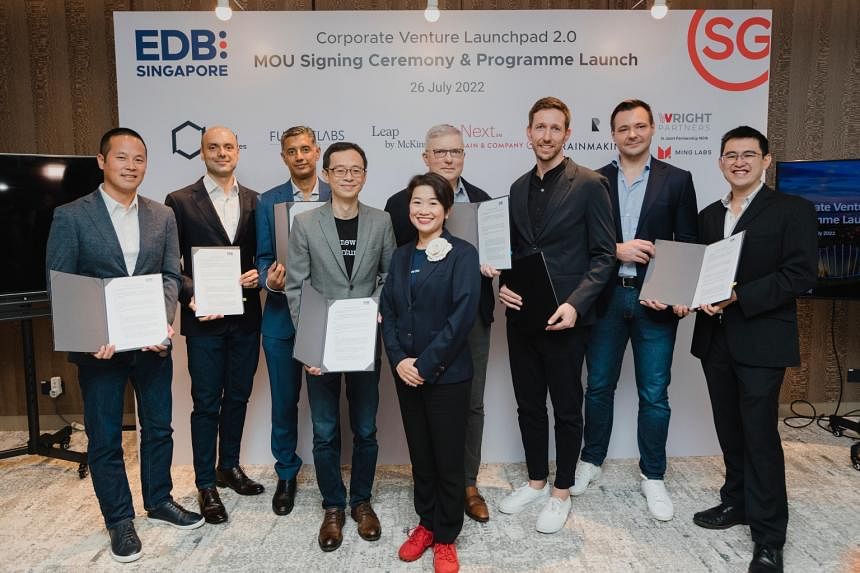SINGAPORE - A programme that helps companies spin off new businesses in high-growth areas such as agritech and senior living will be enhanced with $20 million in fresh funds over the next two years.
It will also be expanded beyond large established companies that are new to corporate venture building. The initiative will now cater to a wider range of businesses, including regional and high-growth companies, and ventures in industries that have potential for breakthroughs in global markets.
Singapore Economic Development Board (EDB) managing director Jacqueline Poh said it is a complicated time for businesses amid geopolitical tension, inflation and downward pressure on global growth.
“As businesses navigate these extremely fast changes in a more disrupted, uncertain, and complex world, there is only one answer. We must be able to adapt and innovate even faster on the inside,” she said at the launch of Corporate Venture Launchpad 2.0 on Tuesday (July 26).
To date, six of the 13 companies that participated in the scheme’s $10 million pilot, launched in May last year, have spun off new ventures, and they have committed at least $50 million of follow-on seed investments to build them, said EDB.
They include Swedish home appliance manufacturer Electrolux, Keppel Land, Mandai Wildlife Group, insurer Singlife with Aviva, and energy trading company Sing Fuels.
The new ventures cover a wide range of areas, including sustainability, agritech, fintech, senior living and the metaverse.
Singapore is home to nearly 80 corporate ventures, almost double the number here in January 2021.
Corporate venturing is a response to rapid disruption, through new technology and business models, which is putting pressure on companies to find new avenues for growth, Ms Poh said.
“One of the best ways is to borrow start-up approaches - lean, agile and speed - by rapidly validating ideas and opportunity spaces, and entrusting a group of talented individuals as founders to grow the new business like a start-up,” she said.
These new ventures can, however, tap the parent company’s competitive advantages such as customer relationships, technical capability and brand recognition.
Under Corporate Venture Launchpad 2.0, EDB hopes to work with companies on 20 to 30 projects over the next two years, added Ms Poh.
The enhanced programme includes co-funding of each concept validation sprint at up to $500,000. EDB will also provide advisory and connections, and deploy its venture builders – those who help to build businesses – to be part of the sprint teams where relevant.
Concept validation sprints aim to quickly test new ideas and approaches to business issues.
An additional $500,000 co-funding will also be available for a “build-and-launch” phase for high potential ventures to accelerate their set-up, develop a minimum viable product and hire a founding team.
Businesses can also access a self-help toolkit to assess venture concepts, evaluate their readiness for venture building and select venture studios, which help to incubate new business ideas.
EDB also signed memorandums of understanding with six appointed venture studios on Tuesday for the enhanced programme.
In the scheme’s pilot programme, German life science giant Bayer partnered agriculture-focused Rabo Partnerships to create a platform that they will launch to support small farmers in Asia-Pacific. It includes digital solutions that aim to improve farmers’ livelihoods and the predictability of crop harvests.
Bayer previously rolled out a mobile app that aims to give smaller farmers weather forecasts and advice on how to reduce the risk of crop loss.
Mr Michael Pareles, open innovation lead for Bayer Crop Science in Asia-Pacific, said it was the first time Bayer had worked with a venture studio.
“We found it really helpful to have a third party like a venture studio that can bring both methodology and discipline to the sprint, critically challenge our assumptions, and leverage external parties and networks beyond our own organisation,” he said.


